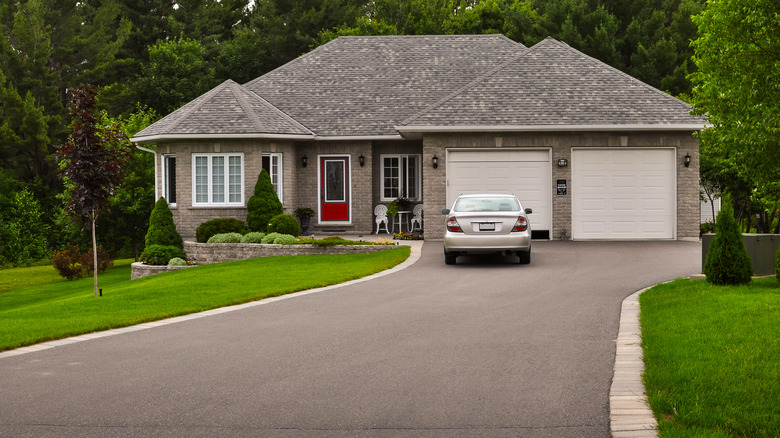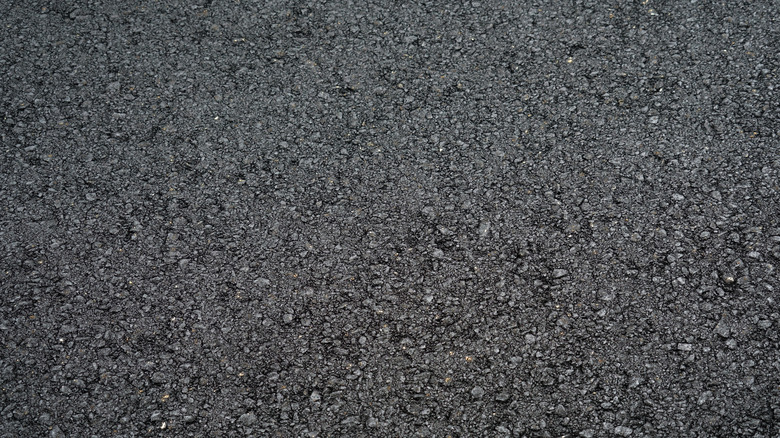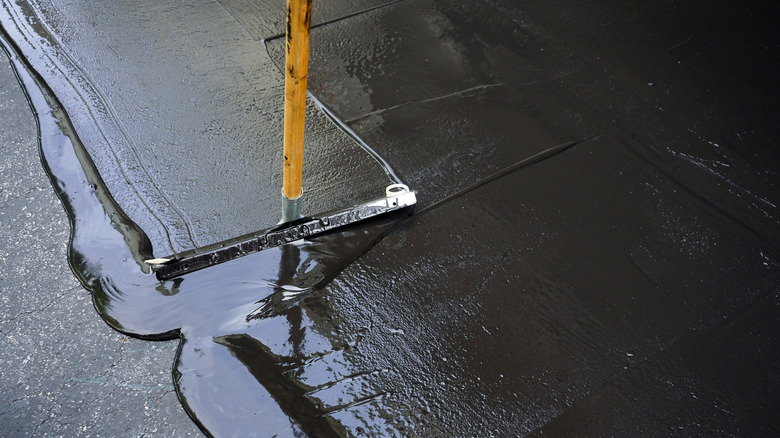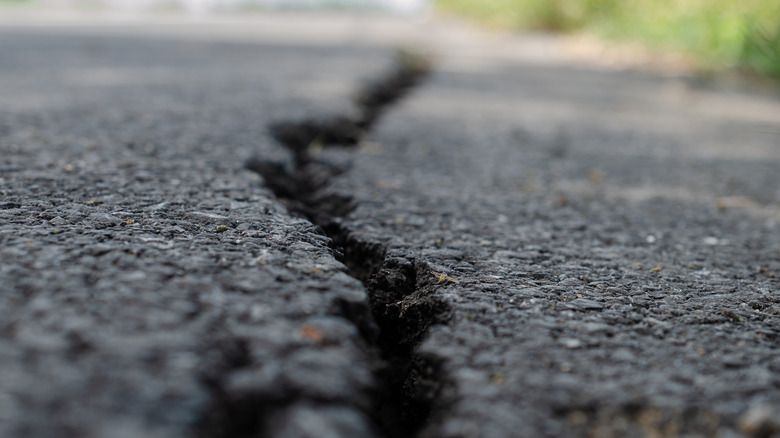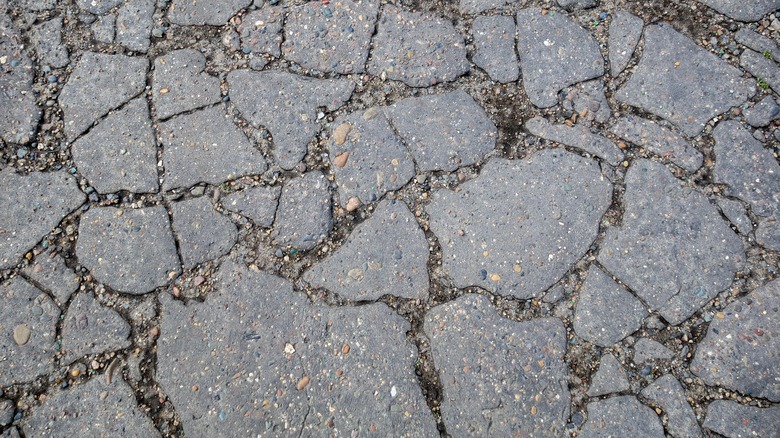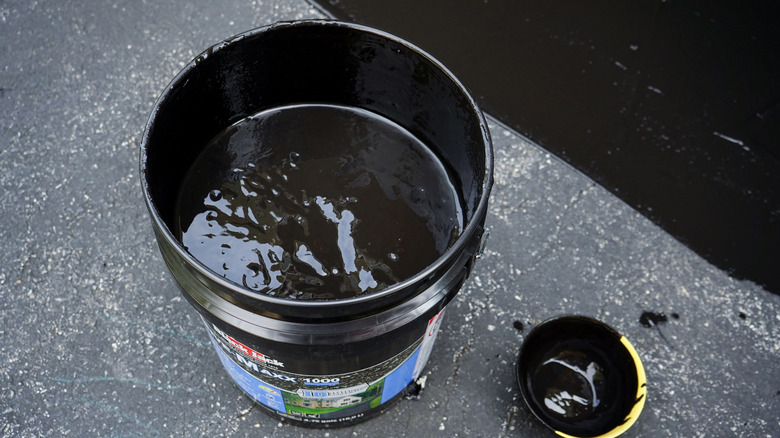Asphalt Driveways: What To Know Before You Buy
If your home's driveway is cracked, uneven, or a neighborhood eyesore, you're probably considering investing in a new asphalt driveway. Even though asphalt driveways are a wonderful investment for most homeowners, there is quite a lot that you should consider before you buy. First, let's go over the basics. According to Angi, asphalt is made of sand and stone bound together using bitumen or another adhesive agent. This mix is then heated and prepared before being rolled onto your driveway to provide many years of reliable use.
While asphalt is probably the most popular choice for driveways, it is far from the only material you have at your disposal. Some homeowners prefer to use concrete due to its superior performance in sweltering weather and availability in a wide variety of color options. Although far more expensive than asphalt driveways, brick driveways are another alternative but less durable. If you seek a driveway that will last for a long time, hide your vehicle's fluid leaks, look great, and save you a few bucks, then an asphalt driveway is probably your best option. Let's look at some of the essential factors you should consider before calling professionals to install your asphalt driveway.
What are asphalt driveways?
According to the Michigan Paving & Materials Company, asphalt is the finished product after mixing a binding agent, filler, and mineral aggregates such as gravel, crushed rock, and sand. While a paving company's preferred mineral aggregate material is often determined by what is readily accessible in your region, coarse materials with rough surfaces are often ideal since they combine better than rounded aggregates, leading to a more uniform driveway, per the Family Handyman.
Asphalt can be mixed in various ways to meet the needs of a homeowner, whether they require added durability for large, heavy vehicles or a porous surface for rainwater to drain to an underlying stone bed. Two of the most critical factors determining an asphalt driveway's longevity are the quality of the various aggregates in the asphalt mixture and professional asphalt paving that accommodates your landscape's unique, strong suits and challenges. According to Family Handyman, two to three inches of asphalt is typically laid over a compacted base for optimal longevity. However, you may choose to utilize a thicker layer of asphalt if your driveway will be a high-trafficked area or a home to heavy vehicles such as an RV or large trucks.
Types of asphalt driveways
Choosing the right type of asphalt to use on your home's driveway can improve its longevity and even positively impact the environment. According to ACT Asphalt Specialties, most residential driveways utilize hot mix asphalt. This asphalt variety stands out for its dark color, which is perfect for hiding automotive fluid stains and has relative ease of repair. As the name suggests, hot mix asphalt is heated before it's combined and pressed into the shape of your driveway. However, its low degree of porousness can collect rain puddles quickly if improperly applied or damaged.
If water runoff is a concern in your municipality, you should consider investing in porous asphalt for your driveway. According to Wolf Paving, porous asphalt may outperform other asphalt options due to its longevity and environmental benefits. Speaking of the latter, you can limit the carbon footprint of your home improvement project by opting for recycled asphalt. While this type of asphalt probably won't turn out as dark as a hot mix asphalt, it is likely the most affordable option and restricts the amount of asphalt in your local landfill. According to ACT Asphalt Specialties, recycled asphalt is also every bit as durable as porous asphalt despite being considerably less expensive.
How long do asphalt driveways last?
According to Angi, the average lifetime of an asphalt driveway is around 15 to 30 years. However, a variety of factors can influence its longevity before it is time for a fresh coat. Perhaps the most important thing you can do to ensure that your driveway thrives for decades is to have it installed by a trusted professional with plenty of experience mixing and applying asphalt. According to Blacktop Concepts, ensuring that the ground is raked correctly and graded will also prolong the life cycle of your asphalt driveway since it prevents premature cracking and damage from pooling water.
The type of vehicles that call your driveway home can also affect how long the asphalt lasts. Angi is confident that a three-inch asphalt driveway can comfortably support average-sized coupes and sedans, and even small pickup trucks for several years. However, if you plan to add large, heavy-duty trucks and RVs to the mix, you may want to invest in a thicker layer of asphalt over your driveway. Per Wolf Paving, heavy vehicles can prematurely deteriorate asphalt where their wheels travel, so if your RV sits in your driveway, consider getting your asphalt laid at least 5 inches thick to stave off unsightly damage.
Asphalt driveway maintenance and repairs
Sadly, a newly-paved asphalt driveway will not remain pristine forever. Although contending with inclement weather and withstanding the weight of heavy vehicles may cause your asphalt driveway to erode over time, per the Asphalt Kingdom, there are ways to maximize your driveway's lifespan. For instance, applying a sealcoat to your asphalt driveway every three years can help it withstand everyday nuisances, including traffic and water. Your driveway will also benefit from a darker, more uniform appearance, just like when it was freshly paved.
According to Wolf Paving, there are also a number of solutions for asphalt driveways that sport cracks, potholes, or wide patches of damaged asphalt. Luckily, small gaps can be quickly filled with sealant, but this should be done as soon as it is spotted, as they can become large and unmanageable over time. Patching a pothole will require new asphalt and the removal of the damaged material. Unlike sealing a crack, this is not a task that can be done on a DIY basis.
For more severe damage to your driveway, it might be necessary to consider milling, an asphalt overlay, or an entirely new driveway. Milling should be considered if your top layer of asphalt is badly damaged, but the base layer is still in good shape. Since milling is cheaper and quicker than replacing your asphalt driveway, it's an attractive option to many homeowners. An overlay is undertaken when a large area of your driveway is damaged but not enough to justify a complete replacement. Wolf Paving says it can essentially be considered a heavy-duty patching job that covers a wide area. However, there is nothing left to be done for truly extensive damage but to tear out your asphalt driveway and have the entire area repaved by a professional.
Average cost of an asphalt driveway
Naturally, many homeowners want the most cost-effective solution for their driveway. So, how does asphalt stack up against concrete, brick, and other materials? According to Bob Vila, the average cost of a new asphalt driveway ranges from $2,932 to $6,568, or $7 to $13 per square foot. This makes asphalt slightly more expensive than concrete, which costs most homeowners between $1,800 to $6,000 to complete their driveway, per Bob Vila. However, HomeGuide says that opting for asphalt will save you a lot of money when compared to constructing your driveway out of brick, stone, or concrete pavers.
While the size of your driveway will be the most significant factor determining the overall cost, considerations such as the type of asphalt you will use are also important when calculating the total price tag of your investment. Of course, the need to unearth the land will also have a profound impact on cost, as this can run you between $1,500 to $5,100, depending on the area being excavated. Other primary considerations are the location of your property — since labor costs are generally proportional to an area's cost of living — and whether you will be paying for pricey extras such as a heated driveway or professional asphalt sealing.
Pros and cons of asphalt driveways
Like most home improvement decisions, getting an asphalt driveway comes with its own unique set of benefits and drawbacks. As such, paying for this driveway variety will prove a wiser investment for some homeowners than others. In terms of advantages, asphalt driveways hold up exceptionally well in areas that get a lot of cold and icy weather, according to The Spruce. While ice and water can cause small cracks in asphalt after years of harsh seasonal conditions, these damages are not nearly as noticeable as concrete cracks. They are also reasonably inexpensive and easy to fix for DIY homeowners.
The other main benefit of owning an asphalt driveway lies in its dark color. While concrete and most paver driveways will readily show fluid spills and other stains, asphalt driveways are adept at hiding their imperfections. Also, they're somewhat easier to clean than concrete surfaces when a particularly nasty spill occurs.
While asphalt's characteristically dark color hides stains well, it also invites the sun's heat, making your driveway hot and surprisingly sticky if you live in an area that regularly gets hot weather, per The Spruce. Also, asphalt driveways require more routine maintenance, such as resealing their surface, than concrete driveways to last as long as possible. Despite this, a long-lasting asphalt driveway may need to be replaced up to 10 years before most concrete driveways.
